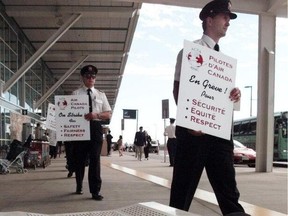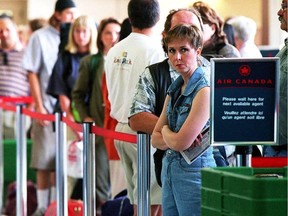There were 2,100 pilots from Air Canada who went on strike on Sept. 1, 1998
Article content
A potential strike is looming after 98 per cent of Air Canada pilots voted in favour of job action last week.
The pilots are pushing for a new contractual agreement with the airline. There’s a possibility a strike could start start as early as mid-September, according to a news release by the Air Line Pilots Association International, which represents the Air Canada pilots.
Advertisement 2
Article content
More than 5,400 pilots took part in the vote, sending a “clear message to management that we are willing to go the distance to secure a contract that reflects the value we bring to Air Canada,” said chair of the Air Canada ALPA Master Executive Council and First Officer Charlene Hudy.
However, she said the goal was not to strike, but rather to modernize their contract. Pilots have been negotiating for “fair compensation, respectable retirement benefits, and quality-of-life improvements” for more than a year.
If the pilots do strike, it would be the first time in more than 25 years.
Why did Air Canada pilots strike in 1998?
The 2,100 pilots from Air Canada who went on strike on Sept. 1, 1998 were upset about working conditions and wages.
The strike was the culmination of labour concessions in the early 1990s, the Wall Street Journal reported. Pilots said they earned 30 to 50 per cent less than their American counterparts. They also said their productivity increased despite the fact they took a pay cut years prior in 1993 — which helped Air Canada reach record profit, according to the Journal.
Article content
Advertisement 3
Article content
On the picket line, pilots held signs that read: “Safety. Fairness. Respect.”

The airline made $427 million in 1997, according to a Calgary Herald article published in 1998. At the time, pilots earned between $32,000 to $200,000, with the average being around $100,000. The Air Line Pilots Association did not immediately respond to a request for comment for details on salaries and how many pilots hit the $100,000 mark.
According to its union, Air Canada pilots flew for an average of 78 to 85 hours a month. The industry average was 75 to 78 hours.
Adding to their sense of urgency, the pilots had been working without a contract since April.
“We all pitched in — the pilots, the flight attendants, the salespeople the mechanics, even management — to turn around from a losing proposition to profitability, and the projections for (1999) are even better,” said then association chairman Jean-Marc Belanger, per the Canadian Press.
While senior management received raises, between 30 and 40 per cent, Belanger said, the pilots did not. He said the pilots would be “happy just bridging the gap with our colleagues in North America.”
Advertisement 4
Article content

Pilots wanted a 12 per cent increase in pay over two years, while Air Canada offered 9 per cent, the Herald reported.
“Our management has failed to address our concerns and we are angered. We are angry, dismayed and displeased that we are forced into this situation,” said Belanger, the Associated Press reported.
What was the outcome for pilots and travellers?
All of Air Canada’s 600 daily flights were grounded, the Herald reported days into the strike.
It affected roughly 60,000 travellers a day. Canadian athletes who were travelling to Malaysia for the Commonwealth Games were forced to seek an alternate route. They were scheduled to travel on Air Canada jetliners, according to the Herald, but rebooked tickets on another airline a week prior.
“With the full support of Air Canada, everyone that’s leaving after midnight is leaving on another airline,” said president of the Commonwealth Games Association of Canada Judy Kent, the Herald reported.

The strike left some customers at the Calgary International Airport upset after airline staff told them to board a flight 10 minutes early in an effort to avoid the deadline. However, that plane did not take off, and passengers had to deboard.
Advertisement 5
Article content
“They lied to us. Why did they board us? I’m madder than hell,” one person told the Herald. Another passenger said they were “handled like a bunch of cattle” and had to sit on the plane for 30 minutes.
Roughly 4,000 flight attendants were issued off-duty status notices, which is comparable to a lay-off notice, two days into the strike, Air Canada spokeswoman Sandie Dexter told the Herald. Other employees were also issued notices.
The strike came to an end almost two weeks after it started. The company estimated its losses at $200 million, but did not credit the strike for all of it, reported Statistics Canada “The company noted that they experienced a pilot strike during September 1998, but that income had deteriorated since the record third quarter of 1997,” as per StatCan.
The union reached a tentative deal with a new two-year contract with a 4 per cent wage increase the first year, followed by 5 per cent the second year — the same terms the airline offered at the outset. Although the union did not achieve its goal of higher wages, it did achieve “improved working conditions, including two free shirts a year and a two-year, $150 shoe allowance,” the Herald reported on Sept. 12.
Advertisement 6
Article content
The deal had “‘far better working conditions’ for the airline’s regional carrier pilots, better benefits, improved pilot training, job protection assurances and the presence of relief pilots on certain overseas flights,” per the Herald.
Pilots returned to work on Sept. 14. In the aftermath of the strike, Air Canada cancelled some of its routes and had to rewrite its winter schedule, the Financial Post reported.
”For the immediate future, Air Canada is going to have to focus on getting back what we lost due to the strike,” said airline president Lamar Durrett.
The hundreds of temporary staff hired by the airline that year — roughly 730 of them — were laid off, or would be laid off, he said.
”It has taken away that much more flexibility in the event that we hit a downturn,” said Durrett about the strike.
Recommended from Editorial
Our website is the place for the latest breaking news, exclusive scoops, longreads and provocative commentary. Please bookmark nationalpost.com and sign up for our newsletters here.
Article content









